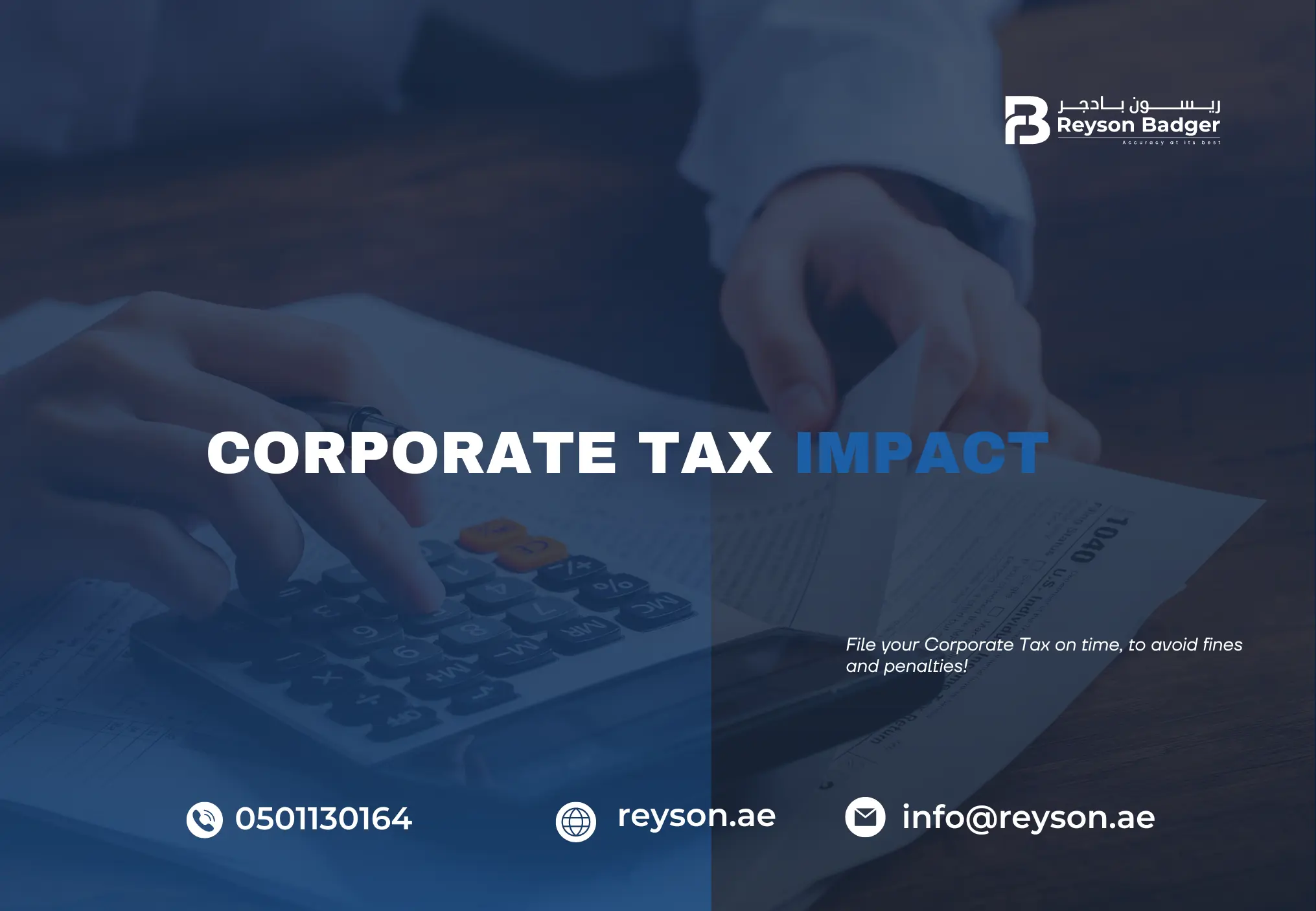
The UAE has long been a haven for businesses, boasting a tax-free environment that attracted companies from across the globe. However, with the introduction of corporate tax on 1 June 2023, the UAE's fiscal landscape underwent a significant shift. This guide delves into the core of this change, exploring the impact of Corporate Tax in UAE on businesses, potential opportunities, and strategies to navigate the new tax regime.

A corporate tax is a type of tax applied on a company's taxable profits, which are the profits remaining after deducting expenses under tax laws. Business tax has been a source of contention in the UAE since it was implemented by Federal Decree-Law No. 47 of 2022, which set a 9% business tax rate that went into effect on June 1, 2023. Businesses with annual profits of less than AED 375,000 will, however, be subject to a 0% corporation tax rate in the UAE, reducing the impact on small and medium-sized firms (SMEs). In addition, the UAE government has implemented Small Business Relief (SBR) to foster an appealing environment for SMEs.
The UAE's corporate tax system is designed to be competitive and transparent. Here's a breakdown of its key features:
To guarantee compliance, Corporate Tax document needs must be assessed. You can avoid Corporate Tax fines in the UAE if you know the complete list of required documents. Document assessments also include a form and the format of the documents that must be maintained.
To calculate your Corporate Tax due, you must keep financial records and other documents. These records and documents contain significant Corporate Tax data and supporting information. These documents contain all of the information needed to file Corporate Tax returns and other documentation with the FTA.
Having doubt on the documents required for Corporate Tax filing? Check out our article on all the necessary document requirements for corporate tax filing.
The detailed process for this Corporate Tax assessment is outlined below:
Review of current financial situation: This is the first step, which entails a thorough examination of the company's current financial state, including earnings, cash flows, assets, and liabilities.
Analysis of new tax law: This step includes an in-depth review of recent tax regulations, such as Federal Decree-Law No. 60 of 2023 in the UAE, to ensure that businesses are fully informed.
Identifying risk: This step entails identifying potential tax risks and ensuring that organisations are ready to address them.
Strategic recommendation: Based on the assessment, you will receive a premium recommendation to align your business operations with the tax system.
The introduction of corporate tax presents both challenges and opportunities for businesses in the UAE. Here's a closer look:
The UAE promises to keep its obligations to businesses established in free zones that do not operate on the mainland, whether through exemptions or tax breaks.
This article gives a more detailed idea of free zone corporate tax in UAE.
The UAE is planning to impose one of the world's lowest tax rates, which is anticipated to attract more international investment and businesses. Its competitive tax policy makes it an attractive site for businesses.
Investors benefit from the tax-free dividends and capital gains generated by qualifying ownership. This results in a favourable change for mergers and acquisitions.
As the government works to transition the UAE from an oil-dependent economy to a technical powerhouse, the implementation of federal taxes demonstrates the country's significant progress in this area. According to experts, the government would transfer its focus from the mainland to free zones, thereby enticing more investment.
Shareholders are likely to strive to keep their portion of profits while passing on the tax burden to the end user, which can limit consumers' purchasing power.
While such a taxation scheme can increase the state's revenue, the risk of a drop in consumer purchasing power may diminish demand for goods, affecting production and sales and reducing short-term growth.
The implementation of corporate tax in the UAE has both beneficial and bad effects on local businesses.
On the bright side, the UAE government can use corporate tax money to help firms with infrastructure development, incentives, and subsidies.
On the negative side, organisations may see an increase in compliance and administrative costs, lowering profitability and competitiveness. Furthermore, restricted funds and cash flow issues may impede their expansion and investment in technology and manpower.
However, the 9% corporation tax rate applies exclusively to firm profits greater than AED 375,000, reducing the negative impact on SMEs.
While navigating the new tax landscape, businesses can consider these strategies to minimize the impact:
The UAE government's small company relief initiative, as defined in Ministerial Decision No. 73 of 2023, intends to reduce the burden of corporate tax in the UAE and compliance costs for start-up enterprises. To be eligible for SBR, taxable persons must earn less than AED 3 million from June 1, 2023 to December 31, 2026.
Qualifying freezone companies and members of a Multinational Group of Companies with revenue above AED 3.15 billion are not eligible for the small business exemption.
The UAE's corporate tax is still in its early stages. Businesses should stay informed about any regulations or interpretations that may emerge. The global tax landscape is also constantly evolving, and the UAE might adapt its system in response to international developments.
The introduction of corporate tax marks a significant change for the UAE. While there are challenges to pass through, the new regime also presents opportunities for businesses that can adapt and strategize effectively. By understanding the Impact of Corporate Tax in UAE core aspects of the tax framework, its potential impact, and available mitigation strategies, businesses can remain competitive and thrive in the evolving UAE market.
Reyson Badger helps companies effectively manage and analyse the impact of corporate tax. We provide personalised strategies for saving money and complying with tax rules. Our team stays up to date on the latest tax laws and offers straightforward guidance and support. Choose Reyson Badger for experienced tax management that improves your financial situation and helps your business growth.
1. What is the impact of corporate tax on startups in the UAE?
Startups have to comply with the corporate tax regulations. Although many will fall below the taxable income threshold, proper tax planning is essential for future growth.
2. Does the corporate tax affect foreign investors in the UAE?
The corporate tax falls on foreign investors with operations based in the UAE. This is a change in the tax policy and therefore essential to comprehend the Impact of Corporate Tax in UAE on international investments.
3. What are the projected economic effects of corporate tax in the UAE?
The impact of Corporate Tax in UAE will lead to improved government revenue, fiscal stability, and increased competitiveness of the UAE in the world.
4. Is corporate tax levied on personal income?
No, the corporate tax in the UAE is not imposed on the earnings of individuals through employment or personal investments, thereby reducing the impact of corporate tax on individuals in UAE.